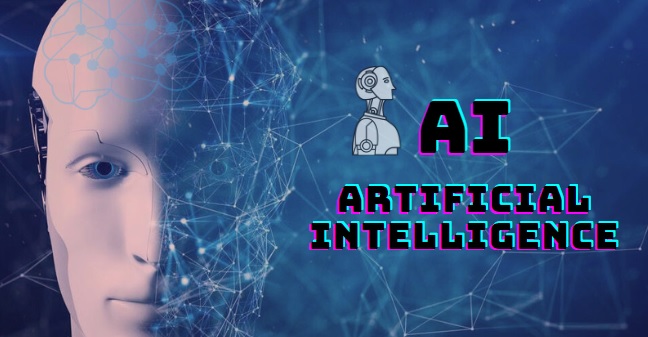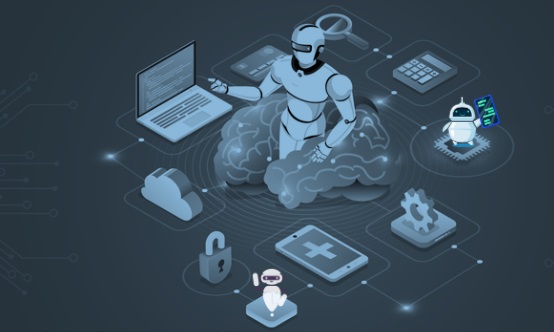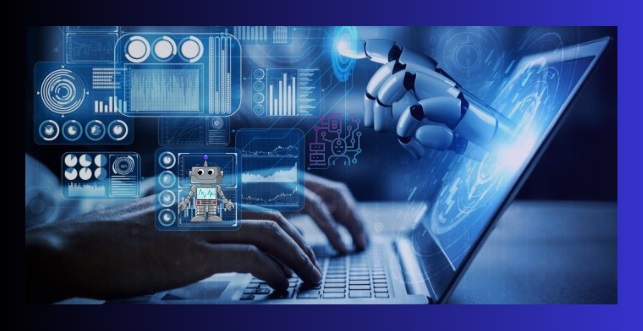We arranged a series of articles starting with ‘Artificial Intelligence (AI): Latest technology trends’, to provide an overview of modern technology trends that will lead the future.
We are living in a digital age and technology is changing rapidly. It’s important for businesses as well as our own life to stay up to date with the latest technology trends, in order to stay competitive and remain ahead of the curve. this article will test your knowledge of the latest technology trends and will be a great way to inform you about the latest advancements.
Currently most popular as well as most uses technologies are – Artificial Intelligence (AI), Machine Learning, the Internet of Things (IoT) Augmented and Virtual, Reality (AR/VR), and Blockchain, etc.
In this article, we will focus on Artificial Intelligence (AI). We will discuss details, how does it work, its uses, benefits, disadvantages, etc.

About Artificial Intelligence (AI)
Artificial Intelligence (AI) is a branch of computer science that works to build automated machines that can think and behave like humans. These systems use algorithms and data to learn from their environment and make informed decisions and results. Currently, a wide range of industries, including healthcare, banking, transportation, and customer service, are utilizing artificial intelligence. This system is capable of automating processes and analyzing data, allowing it to make decisions faster and deliver more accurate results than humans. Self-driving cars, virtual assistants, and facial recognition software are just a few examples of AI.
How does Artificial Intelligence (AI) work:
AI systems employ data banks and algorithmic approaches to make assessments and judgments. By utilizing large quantities of data to train AI systems, they are then able to utilize this data to anticipate outcomes. Through the use of machine learning, deep learning, and natural language processing, AI systems are able to process data, make decisions, and forecast future events. AI systems are designed so that they can continually learn new skills and become more accurate over time.
Uses of Artificial Intelligence (AI)

Artificial Intelligence (AI) in Medical Diagnosis:
AI is used in the medical system to automate processes, analyze data and make decisions. AI can analyze images from X-rays, CT scans, and MRI scans to identify medical issues. By examining historical data and clinical trials, it can be used to find new medications and therapies. AI can also be employed to monitor patients, identify symptoms, and deliver individualized care and therapy. AI can also help doctors accomplish difficult procedures, including robotic-assisted surgery. Finally, by studying a patient’s medical history, lifestyle, and genetics, AI can be utilized to create customized therapies and pharmaceuticals.
Banking System:
Artificial Intelligence (AI) is used in the banking sector to help improve customer service, increase efficiency, reduce costs, and make accurate calculations. AI takes the help of natural language processing, machine learning, and deep learning to handle customer service inquiries, detect fraud, analyze data, and segment customers. AI also allows banks to provide personalized services, such as voice assistants and virtual financial advisors. It provides automated loan decisions, payment processing, and credit risk assessment. Furthermore, it helps to improve risk management and compliance, as well as capital market analysis and algorithmic trading. Additionally, it helps to keep customer data more secure.
Artificial Intelligence (AI) in Transportation systems:
Nowadays AI is hugely implemented in the transportation sector to enhance safety and efficiency. Through computer vision, machine learning, and proper data analysis, it is providing accurate traffic monitoring, route optimization, and vehicle maintenance process. Additionally, AI is used for vehicle to control, automated route planning, and autonomous navigation. The AI system is providing a relaxed journey by providing accurate real-time traffic analysis, and route optimization. Furthermore, transportation businesses provide improved customer service by offering personalized services like intelligent ticketing systems, and automated customer support.
Manufacturing:
Artificial intelligence (AI) is used more and more in the industry to boost productivity, cut industrial huge expenses, and better safety. Routine processes like production scheduling, quality control, and product design are being automated easily by using AI. It is also doing additional applications like supply chain management, process optimization, and predictive maintenance. Through the automation of risky tasks and the provision of intelligent safety measures, AI is also used to increase safety.
Business:
Artificial intelligence (AI) is hugely used in modern business to enhance decision-making, boost productivity, and control extra expenses. It is implemented to automate repetitive operations, such as customer service inquiries, data analysis, and consumer segmentation. Through accurate data analysis, it can provide perfect decisions, fraud detection, and better forecasting. Moreover, by offering services like automated customer assistance, clever ticketing systems, and virtual assistants, AI is being utilized to enhance customer service.
Security:
We are always very concerned about our security; we are very busy keeping everything secure. AI is offering us improved solutions. Security systems can benefit from AI in a number of ways. Artificial intelligence (AI) can be used to identify possible threats more quickly and precisely than humans, as well as to identify patterns of suspicious behavior that can point to an assault. AI-based systems can also be used to keep an eye on systems for any suspicious activity or unauthorized access. And last, AI can automate security procedures like logging and alerting, enabling businesses to react to threats more swiftly.
Artificial Intelligence (AI) in the Education System:
Artificial intelligence (AI) is helping to improve the education system by automating many administrative functions, such as grading tests and providing feedback to students. It is used to identify patterns in student performance, such as which topics are causing the most difficulty, and provide personalized instruction. It can also help to create personalized learning experiences to ensure that each student is receiving the instruction that best suits their learning style. A virtual tutoring system provides students with flexible access to lessons at any time of their choosing. Finally, AI can be used to create adaptive learning systems that can adjust teaching materials and instructional strategies to individual students’ needs.
Agriculture:
The use of AI has revolutionized the agricultural sector, enabling farmers to utilize their resources more, increase productivity, and streamline distribution. Through this, farmers are able to accurately predict weather patterns, allowing them to plan ahead and accordingly adjust crop cultivation. Additionally, AI enables farmers to monitor crop yield, moisture content, and soil quality throughout the growing season, leading to increased productivity. It also assists in reducing food waste by better anticipating consumer demand and optimizing product pricing for greater profitability. Moreover, AI enables farmers to ensure that their agricultural products are delivered to the right markets, in the correct amounts, and at the appropriate price.
Benefits of the use of Artificial Intelligence (AI)

Increase Efficiency:
AI can increase efficiency in work by automating various tasks, making decisions based on data, and increasing accuracy in data analysis. Automation can do perfectly repetitive tasks such as data entry and help free up time for more productive activities. It helps to make decisions faster and more accurately by analyzing large amounts of data, identifying patterns, and generating insights. AI can help improve accuracy in data analysis by using machine learning models to identify trends and predict future outcomes. It helps to identify as well as avoid errors by sifting through large amounts of data and alerting users to any potential problems.
Improved in Decision-Making:
AI enhances decision-making by leveraging data analysis and automation. It quickly and accurately interprets large datasets to identify patterns, trends, correlations, and anomalies that can inform decisions. Automation of data entry and report generation can free up resources for more strategic tasks. Moreover, predictive analytics can be employed to anticipate future outcomes and identify potential risks or opportunities. Lastly, AI can be used to automate decision-making processes, providing faster and more efficient results.
Enhanced Security:
Artificial intelligence (AI) enhances security systems by automating tasks, closely observing, monitoring, and analyzing data to swiftly identify risks. It automates procedures like password reset requests, system inspections, and log analysis, giving security experts more time to work on more difficult jobs. Additionally, it can monitor and examine data more carefully, searching for anomalies and odd behavior that can point to a threat. AI analysis the data to detect threats quickly and accurately, as well as help to respond to threats before they become a problem. A last benefit of AI is that it can help security workers avoid alert fatigue by lowering the number of false positives.
Better Forecasting
AI analyzes large datasets in order to identify patterns, trends, and correlations that can provide better forecasts. It is used to create predictive models, which can forecast future outcomes based on past data. It can forecast automatically, enabling quicker and more precise insights into events to come.
Cost Savings:
Businesses can save money in a number of ways by deploying AI appropriately. Artificial intelligence-driven solutions can replace the need for human labor, freeing up resources for more crucial activities and enabling firms to grow. It can also expedite procedures, make judgments automatically, and examine vast amounts of data to produce insightful results. AI assists organizations in developing cutting-edge goods and services that can bring in new revenue and result in significant cost savings.
Disadvantages of Artificial Intelligence (AI)

Job Loss:
AI is capable of drastically reducing the need for human labor in certain industries. Which will lead to a decrease in job opportunities. There will be fewer job prospects as AI systems become more sophisticated and are used to replace humans in specific professions and tasks. Employment may be impacted as a result, since fewer people will be needed to do certain jobs. Additionally, these systems may require specialized skills, which could further limit job options. It could also take some decision-making processes out of human hands, which could result in decisions being made without human input or supervision. Decisions made without considering the best interests of people or companies could have long-term consequences.
Less Creativeness:
Too much reliance on AI can stifle human inventiveness. AI can automate processes such as product design and generate creative solutions to complex problems. That is typically tackled by humans utilizing creative thinking and problem-solving skills. Reducing human creativity ultimately harms our humanity since humans need to actively engage in creative pursuits to maintain mental health and improve society.
Privacy Issues:
There may be certain drawbacks to using artificial intelligence (AI) to increase privacy. AI adoption has the potential to raise privacy concerns, including the possibility of data misuse and privacy infringement. It is frequently used to gather a lot of data. Which can be used to inform decisions that aren’t necessarily in the user’s best interests. It is used to automate procedures and make decisions, which could result in biased judgments and privacy concerns. Finally, user privacy and autonomy may be lost if it is used to track user activity and create predictions.
High Cost:
The main disadvantage of this system is its high cost. The infrastructure of hardware and software must be significantly invested in, and technical staff must be hired to administer and maintain the systems. For smaller companies and startups that do not have the resources to invest in an AI system. This might be a significant barrier. This system can also have high continuous expenditures for upkeep, improvements, and any required repairs. Additionally, obtaining the vast volumes of data that AI systems require to operate effectively can be expensive.
In conclusion, Artificial Intelligence is a rapidly developing technology. And it is the potential to revolutionize our way of life, work, and communication. It is an automated system that is able to make decisions with greater accuracy than humans. And allowing for increased productivity at a lower cost. It is essential to ensure that proper governance is in place to prevent security issues and privacy concerns. Additionally, it should be used in moderation as overuse could lead to job losses. Through careful monitoring and regulation, the benefits of AI can be maximized while simultaneously minimizing the associated risks.
